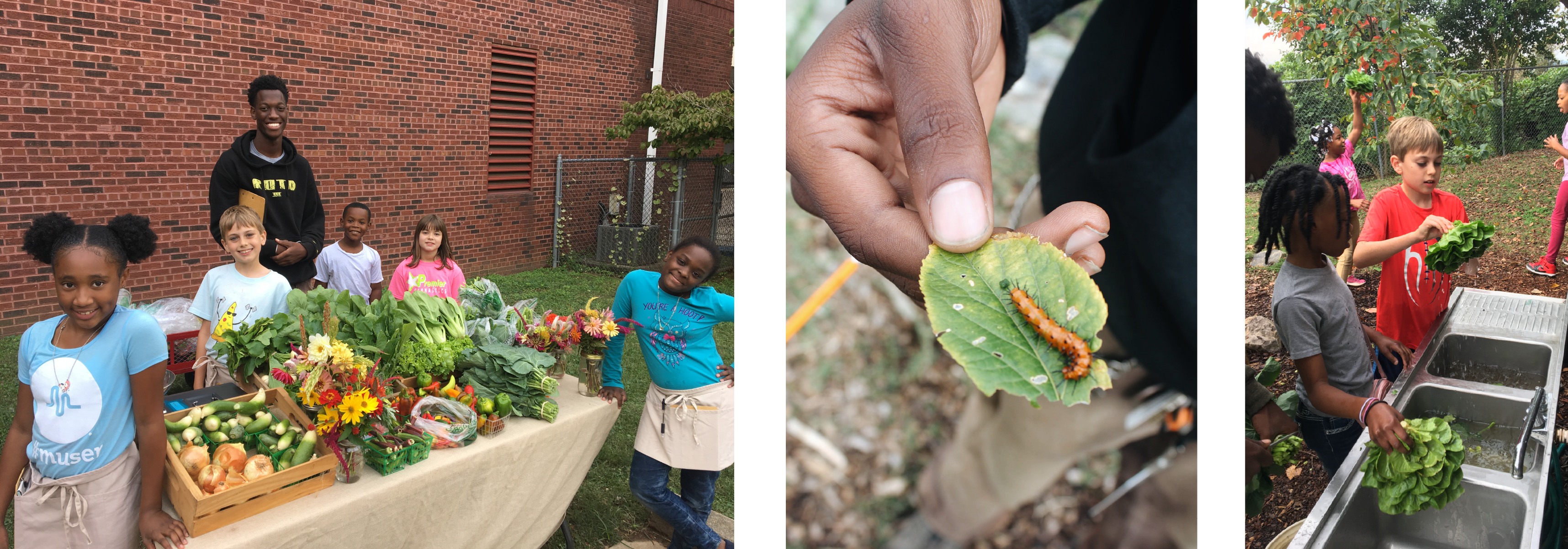FALL | 19
November 15th, 2019Birmingham City School students returned for another semester, JVTF welcomed a new class of Woodlawn High School Interns, summer crops were replaced with cool weather crops, volunteers supported JVTF throughout our sites, and endless amounts of hard work went into the success of this Fall!


DURING SCHOOL: PreK students used their senses to explore the Teaching Farm. They tasted turnips, sorrel, mint, and sweet peppers; smelled lavender, marigold, rosemary, and lemon balm; saw caterpillars, bees, and colorful flowers; touched soft lambs ear, waxy collard greens, and soft & prickly cotton; heard wind through leaves, distant trains, falling water, and playground laughter. Read more.
- Third grade students visited the Teaching Farm to learn about life cycles, particularly metamorphosis. Students learned the difference between complete and incomplete metamorphosis and practiced ordering the life cycle stages of various insects before exploring the Teaching Farm. They observed all the life cycles of the Gulf fritillary butterfly: egg, larva, pupa, and adult.
.
AFTER SCHOOL: Our fall Market Club was a great success! The market crew learned the importance of clear communication, organization, and customer service while also practicing their quick math skills in a fast-paced teamwork environment. They also became professional veggie identifiers and can recommend a recipe for most any crop! Read more.
- In addition to growing and harvesting food, Farm Club students have been busy honing their culinary skills. From chopping and measuring, to recipe creation and adaptation, we’ve learned from both success and failure. Farm Club spent a rainy afternoon saving seeds from okra, flowers, and cotton while waiting on butternut squash to roast for a soup. Sunny days were spent on the Teaching Farm harvesting and preparing produce for Market Club.
.
FARMER ALAN’S CRITTER CORNER: These green critters are among the more unique creatures on the farm. The green lynx spider waits patiently for its prey while camouflaged among the foliage. Meanwhile, the tomato horn worm (it’s actually a caterpillar) voraciously eats our crops, camouflaged from both predator and disappointed farmers.


COMMUNITY GARDEN: Each fall and spring, our community gardeners meet to reflect on the past season, spruce up their plots, and plant their selected crops. If you are interested in becoming a community gardener, email communitygarden@jvtf.org for more information.
VOLUNTEER SPOTLIGHT: Eight students from the University of Tennessee, Knoxville, visited in October and spent their fall break helping out at JVTF. They harvested vegetables, ripped out summer pepper plants to make way for cool season crops, mulched pathways, made bouquets, and so much more. For more information on how you and your group of coworkers or friends can spend a day volunteering on the farm together, email volunteer@jvtf.org.
14TH ANNUAL TWILIGHT SUPPER: In September, the entire Jones Valley Teaching Farm staff came together to transform the Downtown Campus into a beautiful event space. We hosted the 14th annual Twilight Supper, in collaboration with Alabama chefs, to celebrate and raise money for our Good School Food programming. Thank you to our volunteers who helped in the months leading up to the event—it would not have been possible without your hard work! Missed this year’s Twilight Supper but still want to support us? Stay tuned for the Twilight Supper Series, kicking off in February!
CROP UPDATES: The fields downtown are currently full of bok choi, arugula, kale, collards, spigariello, chard, daikon radishes, hakurei turnips, carrots, beets, ginger, turmeric, lemongrass, herbs, and persimmons. As production begins to slow for the colder months, we focus on using what is produced for school programming and will update you via social media when produce is available again.


DURING SCHOOL: Fine arts teacher Ms. Weeks and Farmer partnered up for observational and anatomical drawing lessons with the whole school. Students began by safely observing creatures on the farm and drawing what they saw. In the next lesson, we followed up with an in-depth look at caterpillar anatomy. Did you know that caterpillars have antennae and tentacles?
In another set of lessons with the whole school, the French teacher Dr. Tellis and Farmer have been leading culinary lessons in French cuisine. Kindergarten–2nd grade made ratatouille that they ate over pasta and 3rd–5th grades made veggies au gratin. Students have learned the names of the various tools and veggies in French and so has Farmer!
AFTER SCHOOL: The fall Market Club crew sold out almost every week! Along the way, they learned all about the different fruits, vegetables, and herbs that they sell, perfected their customer service skills, and practiced quick math. We will be back in the spring to continue selling fresh produce to the Glen Iris community. Read more.
Farm Club students have been busy bees this fall! To start, our garden beds look spectacular because of their hard work. Students learned the differences between transplanting and direct sowing as we filled the space with fall and winter crops. In transplanting we take a seedling that has been started in a small container and gently plant it in the garden. Direct sowing is when we plant seeds exactly where we want them to grow. Some crops like broccoli, collards, and kale get a head start in a greenhouse, so we transplanted them. Others, like turnips and carrots, do best when their seeds are planted where you want them. We have also learned the ins and outs of harvesting, which has been important for making some delicious snacks! Students made a veggie stir-fry, which was a favorite last year. We have also made and enjoyed bean dip, pumpkin smoothies, and ratatouille.
.


DURING SCHOOL: Eighth graders in Ms. Eatmon’s social studies class celebrated Hispanic Heritage month and learned about the agricultural contributions that were made by Latin Native Americans. They also used vegetables from the Teaching Farm to make tamales which were originally eaten by the Aztec, Mayan, and Inca civilizations. Read more.
Sixth graders in Mr. Wilson’s class conducted experiments to understand the concepts of weathering, erosion, and deposition of sediment. Students then planted sunflowers to help prevent some of the negative effects of erosion on the Teaching Farm.
.
AFTER SCHOOL: This semester, twelve students spent their afternoons learning about farming and cooking as a team. We had so much fun growing, harvesting, cooking, and eating together and will continue to make great memories through the end of November. We will take a break for the winter and resume in the spring.
Fall Market Club students have been busy practicing math and teamwork this semester. Visit our Market Club outside the North Avondale Library through November 21st to purchase produce and learn more about our vegetables and how to cook them. Students always enjoy seeing familiar faces from school and the community; ask them for recipe ideas, too!


DURING SCHOOL: This fall we harvested over 40 pounds of bok choi and put it to use in lessons. Kindergartners learned tool safety and practiced our 4 B’s (Be responsible, Be respectful, Be safe, and Be an ally). We cooked a bok choi fried rice, and it was delicious!
AFTER SCHOOL: Each Thursday, Market Club students sold fresh produce like collards, kale, carrots, salad mix, herbs, and flowers to the Oliver community. Thank you to everyone who came out to support them! They practiced their math, communication, and entrepreneurial skills, while also becoming veggie experts. They loved telling customers about recipes you could make with our delicious vegetables! Read more.
Farm Club students were busy bees this fall! Each week, we rotated our focus between culinary and farming skills. During the first week, we planted fall crops and throughout the season students learned how to maintain the Teaching Farm and to help the plants grow strong. Then we worked as a team to harvest the vegetables and make delicious meals together. We tested lots of recipes and experimented with the many ways that our crops can be cooked. We had an abundance of okra on the Teaching Farm so we had to get creative to find ways to use it all up. Okra fritters were a Farm Club favorite!
.


DURING SCHOOL: This Fall, Ms. Holiefield’s sixth grade science class visited the Teaching Farm to learn about erosion. They conducted several experiments to see the effects of erosion caused by rain, wind, and waves. Students then helped plant flowers and mulched the garden bed with wood chips to prevent erosion on the Teaching Farm.
AFTER SCHOOL: Putnam’s Market Club met weekly through the fall. During Market Club, students earn badges as they gain and practice new skills. One of the most important badges in Market Club is “Customer Liaison.” After participating in an interactive lesson, students were able to identify best practices and felt prepared for the challenges ahead as they mastered customer service during Veggie Bag pick up days! Read more.
This fall, Farm Club students were in charge of making sure all of our cold season crops were planted and cared for. First, students learned the difference between direct sowing and transplanting crops. Direct sowing is when we plant a seed exactly were we want it to grow in the garden bed. Transplanting is when we sow seeds in small containers, usually in a controlled environment like a greenhouse. Once they are a good strong size, seedlings get planted into the garden beds. The Farm Club crew direct sowed carrots and beets, and transplanted collards, Asian greens, broccoli and cauliflower seedlings. Once the plants matured, they were harvested for many delicious and creative dishes such as Chinese stir-fry, vegetable chili, and kale pizza.
.


DURING SCHOOL: All living things contain four macromolecules: lipids, carbohydrates, proteins, and nucleic acids. Mr. Jan’s freshmen biology classes explored examples of each one on the farm, including the sweet carbohydrates of watermelon. Read more.
- This year, one of our raised beds is dedicated to Mrs. Nelson’s class. Students planted an abundance of fall crops— they are most excited about growing broccoli! We are going to cook a stir fry using their Asian greens, radishes, and carrots once they mature.
- Mrs. Delehanty’s English classes explored the question, “What will the earth look like in a million years?” Students visited the Teaching Farm for hands-on experience with erosion. Then, they made predictions based on their observations.
- Kendy Avalos, Kateria Blevins, Mya Brown, Jada Huff, DeVonte Rich, and Yasmine Weaver volunteered to participate in the Altec Innovation Challenge, a competition for Birmingham City School students to win $10,000 to address a problem in their school or community. Our team decided that we could help improve student-teacher relationships by offering a cooking competition in which teachers and students would work together on teams to create a dish from the farm. We are so proud of them for making it to the final four and, though they did not win, we are excited to implement their ideas in the spring.
.
AFTER SCHOOL: Every Wednesday, students were invited to join us after school to learn farm skills, cook a variety of dishes, and enjoy being outside. When school started, summer crops were in full swing. Students learned how to use garden tools, plant flowers, and harvest peppers and watermelon. Did you notice the flowers growing in front of the school? You can thank Farm Club students for bringing soil over and planting them! We tested several recipes including watermelon salsa and pickled okra. As summer transitioned to fall, we harvested carrots and peanuts and enjoyed orzo with caramelized fall vegetables.
INTERN UPDATES: Our new class of interns got right to work planting fall crops. Every Monday, they harvested and washed the vegetables to sell at the Farm Stand. Interns weeded, raked, and formed the soil into “beds,” or rows, for planting. Each intern got their own space to grow food. Kateria’s favorite task was choosing what to plant in her raised bed. She chose vegetables that her family and teachers would enjoy as well. Read more.
.
